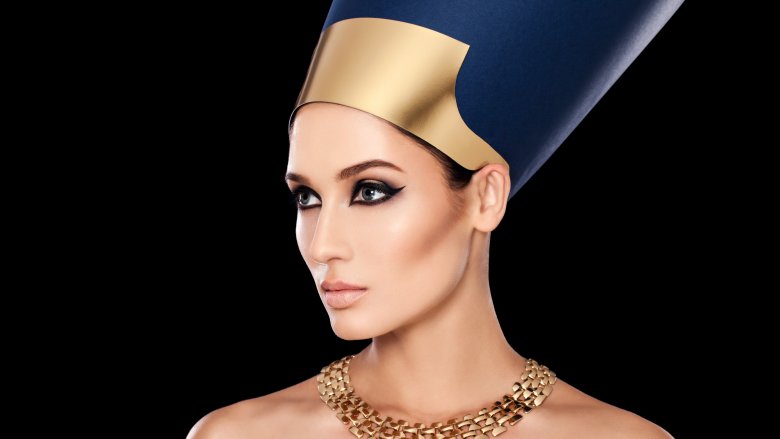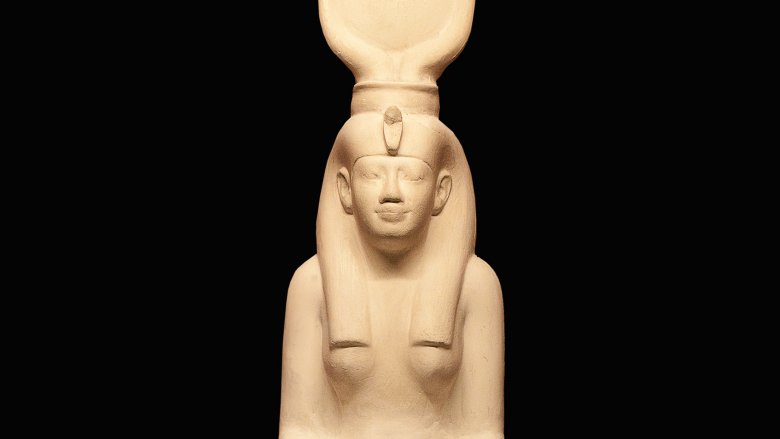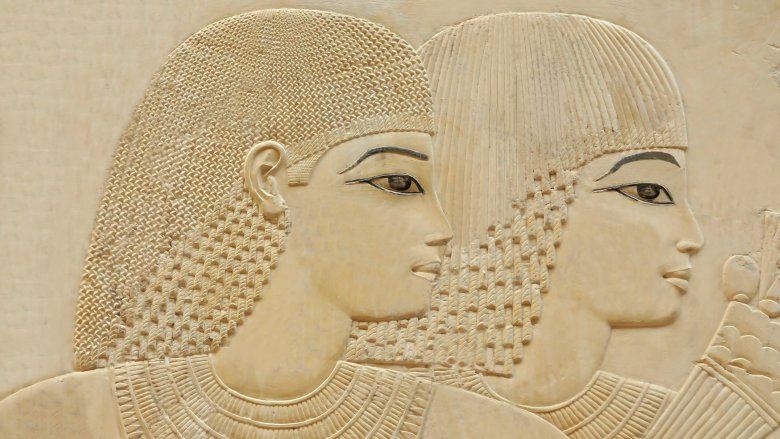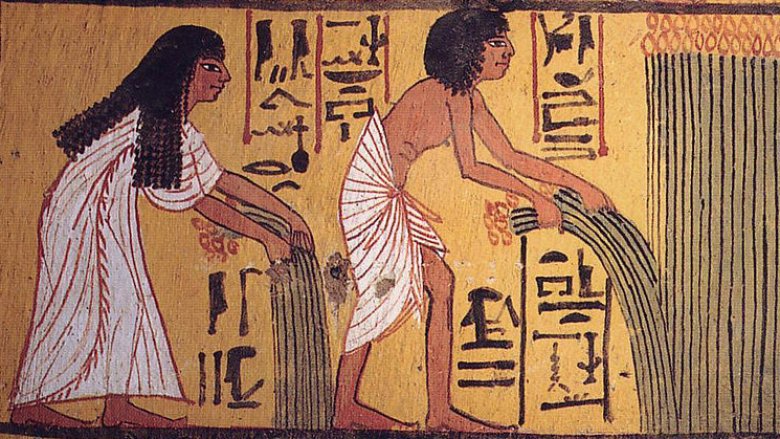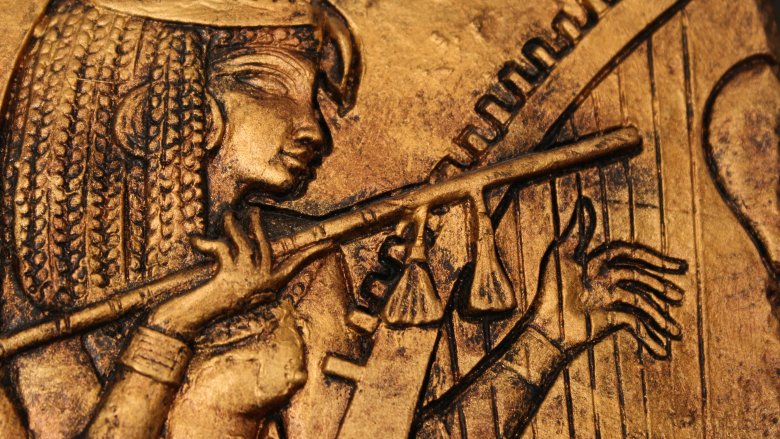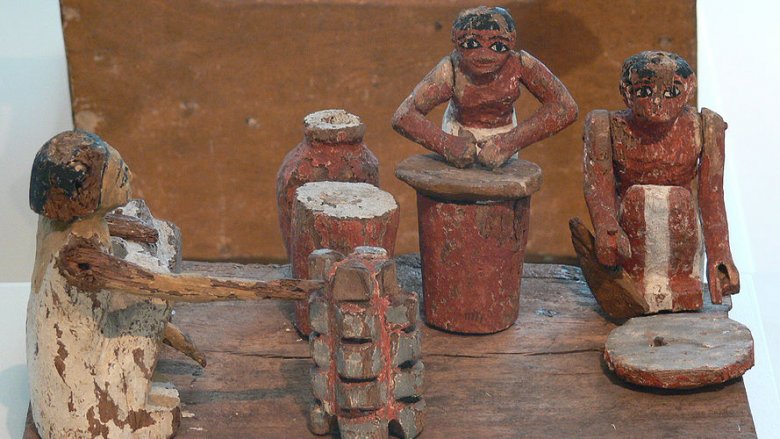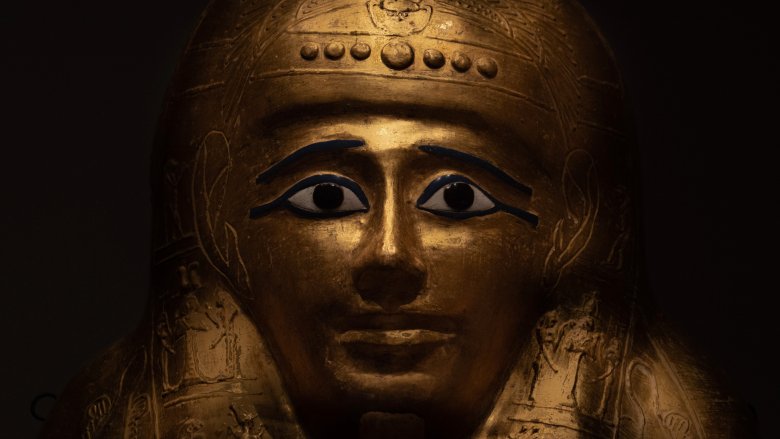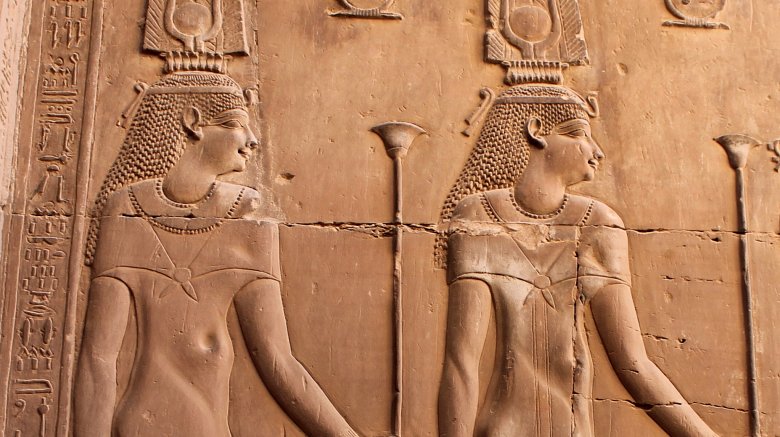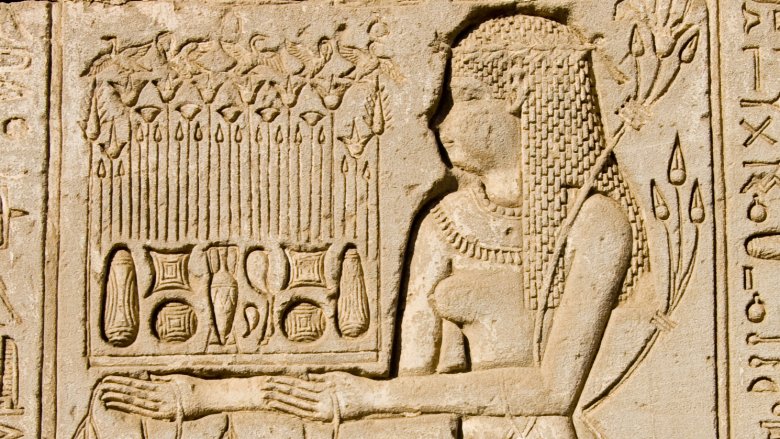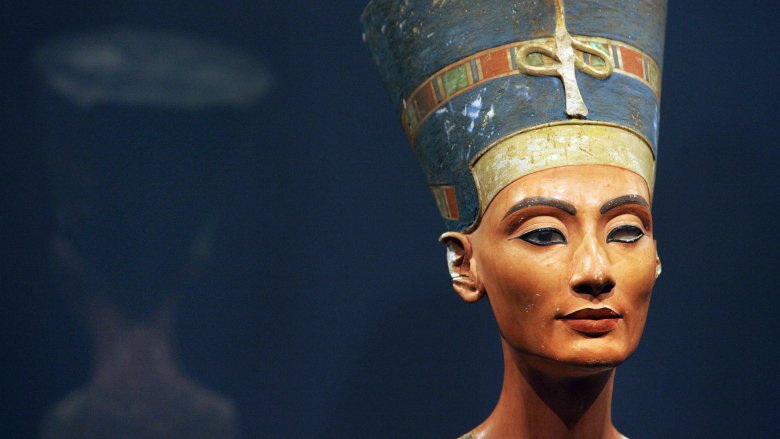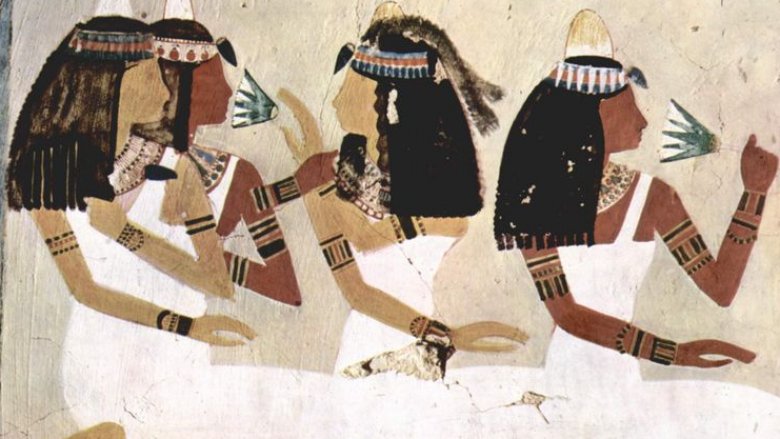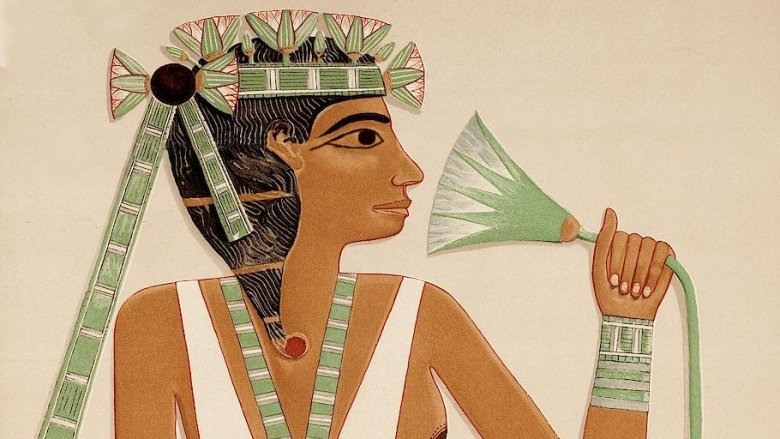What Life Was Really Like For Women In Ancient Egypt
A lot of the time, people think of women's rights as something that started only very recently. Society in the past was horrible compared to the glorious, enlightened geniuses of the present. To make ourselves look good, everyone else has to be bad.
But history isn't a straight line. Feminism wasn't something invented in the 1940s or even the 1840s. While there have been plenty of times in history when women were horrifically oppressed (looking at you, Ancient Greece), there were also periods, in some cases long periods, where they enjoyed almost equal rights to men. Ancient Egypt was one such time.
If you ignore the slavery and the disease and living at the mercy of the Nile River, Ancient Egypt was a pretty awesome place to be a woman. But just how awesome was it? Well, from the importance of alcohol to matters of makeup, here's what life was really like for women in Ancient Egypt.
Ancient Egyptian women were rolling in rights
It's almost unbelievable the number of rights women in Ancient Egypt had. According to Ancient History Encyclopedia, in Ancient Egypt, women could, "own land, initiate divorce, own and operate their own business," and have many kinds of jobs outside the home. But wait, there's more! They could also own their own houses, "enter into contracts with men, have abortions, and dispose of their own property as they saw fit." Ancient Pages adds they could get drunk, make legally-binding wills, and receive both the same pay as men for the same work and the same punishments for the same crimes. It was a level of personal and sexual freedom that no other ancient civilization gave women and wasn't even common in modern times until recently. When the Ancient Greek historian Herodotus visited Egypt, he was shocked at how women behaved. This made sense, since he came from a place where men didn't even like women going outside, and suddenly, he was in a feminist utopia.
Well, almost. No society in history has gotten the equality of the sexes thing right, and Ancient Egypt wasn't perfect. While women did sometimes have authority over men, that wasn't considered ideal, and men were usually in charge. There were positions women couldn't hold, usually those of the most important government officials. And in 3,000 years, Ancient Egypt only managed to have seven female rulers. Still, the US hasn't managed one woman president yet, so we can't really say anything.
Ancient Egyptian marriages were interesting
Women had a ton of rights in Ancient Egypt, although things were a bit tricky when it came to marriage. According to Short History, girls usually got married right after they hit puberty, which at the time was generally about 13 years old. While boys often weren't that much older, usually marrying between 16 and 20, it wasn't uncommon for teen girls to marry much older men. So how a marriage can really be an "equal partnership" when you have a major age discrepancy is questionable.
Still, Ancient History Encyclopedia says that while it was understood that men were the head of the household and had the final word, there's "plenty of evidence to suggest that men consulted with their wives regularly." Ancient Egyptian fathers gave marriage advice to their sons that included "do not control your wife in her house," not to snap at her, to "recognize her skill," to enjoy her company, and to "[desist] from strife at home." Still, wives had certain expectations on them, like having lots of children, and if they committed adultery, they could be killed.
But if they didn't like their husband, divorce was simple. A woman just had to say she wanted one. She didn't even need a reason like infidelity on her husband's part. And she got custody of any children.
Running the home was a massive responsibility
While women may have been equal to their husbands, the job of taking care of the house still fell to them. Rich women might have servants or slaves, and many women also had jobs outside the home, but how well their house was kept was still on their heads. According to Ancient History Encyclopedia, while men helped out with housework from time to time, women had a lot to do.
In a time before alarm clocks, a woman had to wake her whole family up so they could go to work or school. Then she had to take care of the family altar. Every house had one, and keeping the gods happy was the woman's job. Then she had to cook breakfast, do the dishes, haul the daily water from the well, do all the childcare, and take care of any elderly relatives. And of course, she had to feed, water, and generally take care of any animals the family owned. Plus, she had to make lunch, do some weaving and sewing, do laundry, bake bread, brew beer, make dinner, serve dinner, clean up dinner, put everyone to bed, and do it all again the next day. And this was before there were any appliances to make her life a tiny bit easier.
Some tasks were extra essential. The Ancient Egyptians were neat freaks, meaning the house needed to be spotless, so it looked nice, but also to keep pests away. Tending the garden was also super important, since it was the source of most of the family's food.
Ancient Egyptian women often had jobs outside the home
Plenty of Ancient Egyptian women worked in the domestic sphere, but it was also perfectly acceptable for women to — wait for it — work outside the home. According to Ancient History Encyclopedia, the list of jobs they could do was basically endless, and many of them involved authority over men.
In a time before locks, when an important room or container needed to be closed and stay closed, you called on a sealer. These bureaucrats carried official, authorized seals that would have to be broken to open whatever they were used to close, so it was a great way of locking something. That made the position of sealer one of the most important jobs in Ancient Egypt, and women sealers were considered equal to their male counterparts.
Women could be doctors, as well, and the female physician Pesehet even taught male students in a medical school. Male patients would also see lady doctors with no issue. There were female dentists, female seers who interpreted dreams and omens for people, and women who ran textile manufacturing businesses. There are even paintings of these women supervising their workers. Ladies who had a talent for performing could become musicians, singers, and dancers, entertaining privately and in public temple events.
Even women who liked domestic work could do it on the professional level. Girls could become servants as teenagers and rise up the ranks. The top position was household manager, basically running everything for a rich woman who didn't want to do it herself.
Women made beer, and Ancient Egyptians loved beer
There was one job in Egypt that held supreme importance, and in a completely unexpected twist, it was dominated by women. That job was beer brewer. Beer was vital to Ancient Egyptian existence. The story went that it had been given to humanity by the god Osiris, with breweries watched over by the goddess Tenenet, according to Ancient History Encyclopedia. Another story said when the goddess Sekhmet decided to destroy humanity, she was tricked into getting drunk on beer, passed out, and forgot about it. These and other gods were regularly given offerings of beer, and many temple rituals involved getting very wasted.
So beer was important on a spiritual level but also on a practical level. Ancient Egypt Online says everyone drank beer, including children. Beer was seen not so much as a fun drink but a nutritious food staple. Laborers were often paid partly in beer, including the ones working on the pyramids, who got a daily ration of 1 ⅓ gallons each. When experts at the British Museum recreated Ancient Egyptian beer, they were surprised to find it was "absolutely delicious."
Since beer was really a food, that made brewing cooking, and cooking was women's work. There's evidence that, definitely in early Egyptian history and probably for most of it, breweries were "entirely operated by females." They made huge quantities of booze, which meant they could make a lot of money. And since beer was so vital and ubiquitous, it was an important, honorable profession.
Women could be collateral
Slavery was a complicated institution in Ancient Egypt. There were different levels of servitude, and it's often hard for experts to distinguish between them, according to Tour Egypt. Servants were a thing, but so were slaves, with no distinct dividing line. People who owned land could still be listed as property of a king, making them sort of equivalent to serfs. Slavery was inherited (if your mother was a slave, regardless of who your father was, then you would also be a slave), or prisoners of war could find themselves enslaved, and slavery could even be a temporary thing you (more or less) chose for yourself.
The UCLA Encyclopedia of Egyptology says in times of famine, men and women could offer to become slaves in order to make sure they got enough food. Sometimes, men found themselves in debt, and they would offer family members, usually women, as collateral. Those women would remain slaves until the debt was repaid. Even among slaves there was a hierarchy, with foreign slaves seen as "better" since originally, they or their families had been of a higher class than regular Egyptian slaves.
Slaves could own property and negotiate transactions. There's a record of two slave women who gave their master some of their own land in exchange for goods. While some slaves became like members of the family, others were freed. One way of finding freedom was by being "purified" and going to work in a temple, and as it turns out, King Tut actually purified some slave women who worked in his palace.
Ancient Egyptian women could do what they wanted in the bedroom
Prudish, male, Victorian researchers though Ancient Egypt had prostitutes because, obviously, any women who were having sex out of wedlock must've been working girls. But that was totally wrong.
According to Ancient Egyptian Sexuality , people back then weren't hung up on sex. Even their gods and goddesses were always getting up to filthy stuff. Indeed, with the exception of adultery, which was a serious no-no, Ancient Egyptians seem to have been totally cool with women doing whatever. Ancient History Encyclopedia says there was no Ancient Egyptian word for "virgin," possibly meaning that didn't matter. There was definitely no guilt attached to young, single women having their fun, and if one of them ended up pregnant, it was probably something to be celebrated. Fertility was so important to the Egyptians that an out-of-wedlock teen pregnancy was a great thing, because it meant lots more babies to come.
There are no records of brothels in 3,000 years of Ancient Egyptian history. What they did have were "sacred prostitutes" who worked in temples. They were there to scratch the priest's itch. This was a hugely honorable position, one families would offer up their most beautiful daughters for. The women would walk around in sheer clothing, or just naked, happily calling attention to their job. They didn't even get paid, the honor was so great. When they got older, they would leave and go get married, with no shame attached to their previous profession at all.
Priestesses were powerful and very clean
The Ancient Egyptians were seriously religious. Keeping the gods happy was of the utmost importance, so the people who served them on a day-to-day basis had lots of power. This included women, since there were plenty of priestesses. While Ancient History Encyclopedia says it was typical for female attendants to serve goddesses, this wasn't always the case. Some priestesses served male deities, including the all-important Amun. One woman held the position God's Wife of Amun, a job that "would eventually become as powerful as that of the king."
Literally anyone who worked in a temple was considered a priest or priestess, so daily life varied drastically, depending on whether you were more on the janitor end or the high priestess end of the scale. Rituals could involve bathing and dressing a statue of a goddess, lighting sacred fires, or cooking food for the deity. Many priestesses worked part-time, just one month out of every four. According to Herodotus, priestesses had to be super clean, bathing four times a day and shaving all the hair off their bodies and heads (including eyebrows and eyelashes at some temples) to keep lice away and to stay pristine. They also had to practice singing and dancing, so they could entertain their goddess.
The power some priestesses had is evident in their tombs. National Geographic reported on a tomb discovered in 2017, belonging to Hetpet, a priestess of Hathor. According to the magazine, it was "lavishly decorated," including paintings of cheeky monkeys and hunting scenes.
Royal women had a say in running the country
Ancient Egyptian royalty lived lives of luxury. While there were a small number of women who held the top job in Ancient Egyptian history, the vast majority of pharaohs were men. But they had women in their lives. Lots of them.
Ancient History Encyclopedia says each pharaoh would have numerous queens. One of them would be the most important "principle wife." While in the early years of Ancient Egypt, a queen might just be expected to run the palace, support her husband, and act as regent for an underage son, in the New Kingdom, queens had major power. She got her own royal and religious titles, official duties, land, an income, and a degree of independence. Queens were often the pharaoh's most important counselors, who according to Historic Mysteries, "molded the pharaoh's thinking in matters of state and religion and provided him with strong support." They might act as diplomats, and at least one had her name written in a cartouche, just like a king. Some pharaohs had their wives depicted in statues, occasionally the same size as their own, standing or sitting beside them, making the two royals appear equal in importance. Nefertiti (pictured) basically took over running the country for her husband while he concentrated on religion.
The royal line was passed through women, not men, so they were of supreme importance, even daughters of the pharaoh. Of course, the men these royal women were having kids with were often their brothers, fathers, or uncles, so it's not all great.
Egyptian women had fertility tattoos
Until very recently, it was thought only Ancient Egyptian women got tattoos. After all, only women were depicted with tattoos in Ancient Egyptian art, and of all the Egyptian mummies that had been found, only the female ones were inked. Of course, it was male archaeologists who usually found these mummies (since they were basically all dudes until recently) and they had some not-so-nice theories about the women with body art. According to Groupthink, the male archaeologists decided these ladies must be "dancing girls" or of other "dubious status." Even if they found them buried among royalty, at best they must have been a pharaoh's concubine.
Now we know that's not accurate at all. One of the slut-shamed mummies turned out to be the priestess Amunet, which excavators would've realized if they'd just read her burial inscription. Ancient History Encyclopedia says as more tattooed women were connected to the royal court, scholars had to change their theories. Now, it seems tattoos might've been connected to fertility. In general, these tattoos (usually patterns of dots) appear on women's stomachs, thighs, and breasts. It seems women inked themselves to honor the goddess of fertility and as a kind of permanent amulet, giving them help conceiving but also protection during pregnancy and childbirth. The tattoo artists were also exclusively women.
Only in 2018 was the first discovery of a tattooed male mummy revealed. So inked men did exist in Ancient Egypt, but so far, it seems very uncommon.
A women's appearance was very important
Everyone can immediately call to mind what an Ancient Egyptian lady looks like, whether it's the head of Nefertiti, one of a million images of what Cleopatra might've looked like, or just a random woman painted with her head turned to the side. And that distinctive look was hugely important to the average Ancient Egyptian woman. According to Ancient Pages, clothing was considered "one of the most important elements in a person's life."
The Ancient Egyptians are famous for one look because it stuck around for thousands of years. No twice-yearly fashion shows full of new styles for them. Women wore a basic, tight, strappy dress that fell to their ankles. In the winter, they would throw a thick linen cloak over their shoulders. Women working in the fields switched to a short skirt and nothing else. The "in" color for all clothing was white, as much for practical reasons in the heat as anything. Some new fads did come in, including pleated cloth and brightly colored fringe. All women, no matter how poor, wore jewelry. Jewelry was vital to look attractive for the gods, so women covered themselves in beaded necklaces, bracelets, earrings, collar, and rings.
Makeup was not only aesthetic but also holy. Religion and beauty went hand in hand, so everyone wore makeup. Women did elaborate eye makeup, which might've also been practical, as the thick black kohl could've acted a bit like sunglasses. They also shaved their heads and wore wigs, completing the look.
